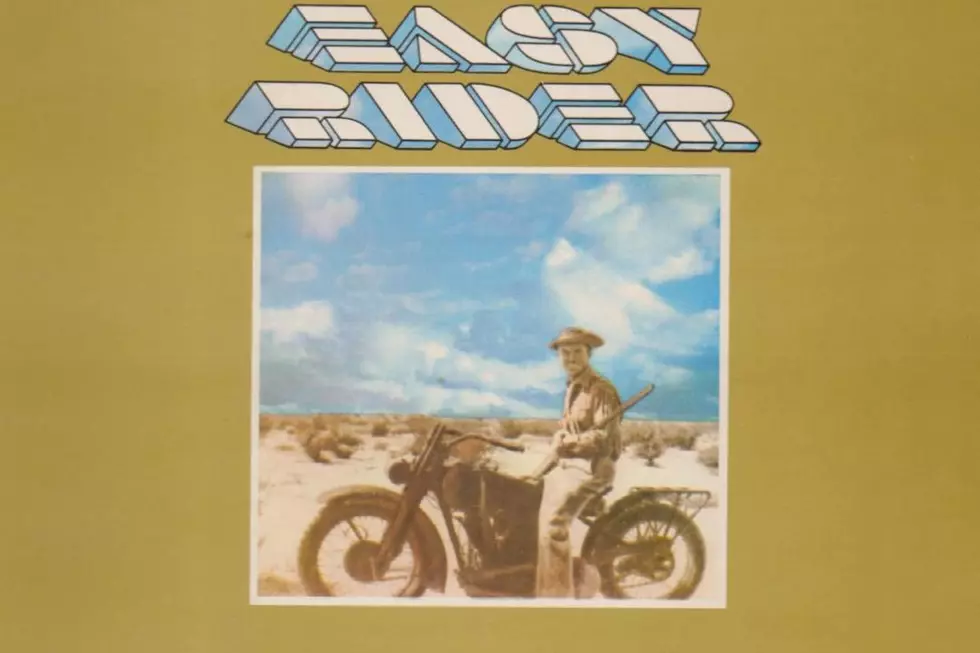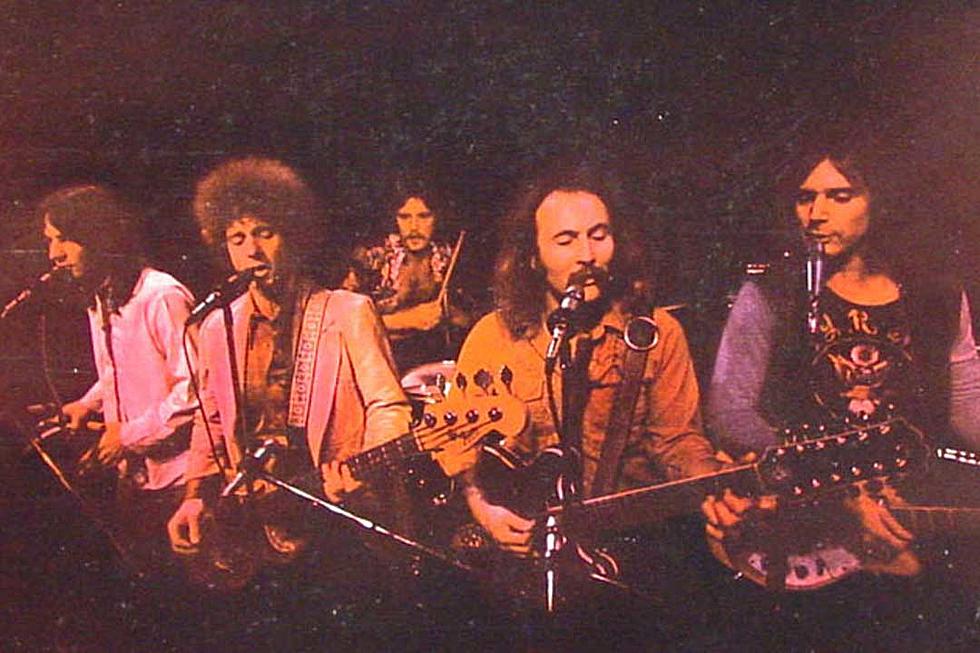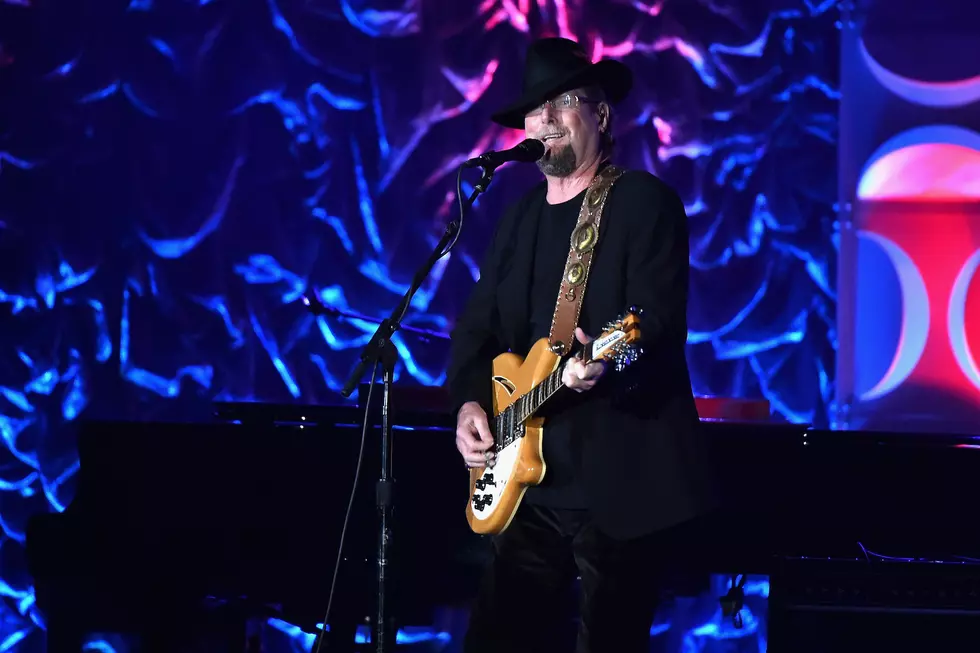
How the Byrds Returned to Their Roots on ‘Ballad of Easy Rider’
Other than the title track, the Byrds’ Ballad of Easy Rider had nothing to do with the iconic biker film.
The album, released on Nov. 10, 1969, is a blend of rock, R&B, folk, gospel and country-rock. Byrds’ founder Roger McGuinn was joined by guitarist Clarence White, bassist John York and drummer Gene Parsons, all singers and songwriters, to create one of the best of the late-period Byrds albums.
Because McGuinn worked with lyricist Jacques Levy on the musical Gene Tryp during the production of Ballad of Easy Rider, the title track would be his only new composition. Each of his bandmates contributed a song of their own. The album is rounded out by cover songs and new arrangements of traditional tunes.
“We were trying to do something different on that album,” York told the Byrds Lyrics Page. “We were each supposed to bring in four songs that we really liked. In the shows, we were pretty much doing the same 14 songs – but, after the gigs, we'd play all sorts of things because of our different backgrounds. We started to sneak more things into the live shows and to Roger's credit, he was willing.”
Terry Melcher, who produced the Byrds’ first two albums in 1965, returned to help steer the band back to its roots: “Nice harmonies, good choice of tunes,” Parsons recalled in the documentary Under Review. “We loved Terry Melcher. Terry was soulful, heartfelt. He loved the music, he was very talented in his own right. ... He was a very musical man and he came up with a lot of good ideas. ... Terry really got involved in a personal way, and immersed himself in the music of the band.”
The title track became the LP's first single. McGuinn had recorded a solo version for the film’s 1969 soundtrack but, on Ballad of Easy Rider, the Byrds speeded up the tempo and Melcher added an orchestra to produce one of the group’s classics.
Listen to the Byrds Perform 'Jesus Is Just Alright'
“A friend of mine [producer Peter Fonda] was putting together a low-budget motorcycle movie and, to save money on it, he did something unusual at the time: He dubbed his record collection onto the soundtrack," McGuinn said on his live album Stories, Songs & Friends. "And he liked the way it sounded, but he thought he ought to get somebody to write him a song for it.
"So he took the movie to New York and he screened it for Bob Dylan," McGuinn added, "and Dylan sat there in the screening room and wrote down some notes on a little cocktail napkin and said, ‘Here, give this to McGuinn. He’ll know what to do with it.'"
Ballad of Easy Rider was born. “So, Peter Fonda took the napkin – and this is like the Holy Grail – he flew back to L.A., he came over to my house with it, he said, ‘Bob wants you to have this, man,’ McGuinn said. "I looked at it, it said, ‘The river flows, it flows to the sea, wherever that river goes, that’s where I want to be, flow river, flow.’ I got my guitar out and I made up a tune for it and finished off the words."
McGuinn took the lead on the second single, "Jesus Is Just Alright," originally recorded by gospel group the Art Reynolds Singers in 1966. Parsons attended the session, which was produced by his friend Gib Guilbeau, and remembered the tune.
“He introduced us to it,” McGuinn said, “and we thought it was a good song to work up. Interesting, you talk about versions of it, the Doobie Brothers came out with almost an identical arrangement to the one we had done, but they got the hit with it. It just had a real uplifting beat to it and everything. We had a fun time singing it and recording it.”
Though they would become fan favorites, neither single soared up the charts; "Ballad of Easy Rider" reached No. 65 and "Jesus Is Just Alright" went to just No. 97.
Listen to the Byrds Perform 'Ballad of Easy Rider'
McGuinn, one of the best interpreters of Dylan’s music, slowed down the tempo for "It’s All Over Now, Baby Blue." The Byrds, with Melcher at the controls, had unsuccessfully attempted song twice in 1965 for the Turn! Turn! Turn! LP. “Terry came in and said ‘All right, we’ve been trying to get this one right for a long time. Let’s take a different approach, let’s slow it down. Let’s slow it down and let it breathe,” Parsons said. “And let’s fill this studio with some really ethereal music. That’s how it came out.”
White's guitar was played through a Leslie speaker, which modifies the sound with a rotating drum and horn. “It's an effect that it almost sounds like it's two notes being played as one,” Parsons adds. “Clarence really learned how to use that. And that effect is very prominent in 'It's All Over Now, Baby Blue.’”
McGuinn also led on Pamela Polland’s country-flavored "Tulsa County Blue," which featured White's bluegrass picking, and Woody Guthrie’s "Deportee (Plane Wreck at Los Gatos)."
White, who died in 1973, sang lead on "Oil in My Lamp," a traditional Christian hymn given the country-rock treatment in an arrangement by White and Parsons. "It's a song that we used to sing in the back of the school bus when I was going to high school," Parsons said. "Clarence loved the tune and he said, 'Well, let's do some harmonies on it too and so there you have it.'"
York wrote and sang "Fido," the tale of a stray dog he’d come across on tour. The funky track ventures far from the traditional Byrds’ sound. “I wanted to get some R&B influence on the record,” York said. “The idea was Gene Parsons would have a chance to do some kind of drum solo. The song's kind of like 'Quinn the Eskimo.’ It didn't exactly come off the way I hoped it would -- I’ve never done it since then -- but it was an attempt to open things up a bit.”
McGuinn, in a conversation with Cleveland.com, later argued that "Fido" “to me is not the Byrds. When you let the bass player do a lead vocal, it's just not the same. It loses some of its cohesiveness.”
Listen to the Byrds Perform ‘There Must Be Someone’
Parsons contributed "Gunga Din," his nickname for York. “Yes, 'Gunga Din' is about me,” York said. “Gene wrote it about something that happened at the Gramercy Park Hotel in New York. We always stayed there. In those days, it was real silverware and cloth napkins and very snooty. They sure liked our money, but they didn't like the boots and leather jacket I was wearing at the time. I wanted to take my mother to dinner but they wouldn't let us in the dining room. Normally I would have let it roll off my back, but because my mom was there I really went off and started screaming at the maitre d’.”
Parsons also sings lead on "There Must Be Someone" by country singer Vern Gosdin. “I'd done a lot of work with Vern, both Clarence and I had,” Parsons said. “Vern wrote this song one night after coming home from a gig. He walked into his house in Bell Gardens [Calif.] about four in the morning and his house was empty: His wife was gone, his kids were gone, the furniture was gone. Everything was gone except for a stool in the middle of the room that had a notebook saying, ‘Vern, I'm leaving you. You'll never see me or your kids again.’”
Side one wraps up with "Jack Tarr the Sailor," a British sea shanty that remains one of McGuinn’s favorite genres. McGuinn closes side two with the quirky "Armstrong, Aldrin and Collins," a tribute to the first astronauts to land on the moon in 1969. New tunes include Jackson Browne’s "Mae Jean Goes to Hollywood"; the instrumental "Build It Up"; and traditional tunes "Way Behind the Sun" and "Fiddler a Dram (Moog Experiment)."
Helped by its association with the hit film, Ballad of Easy Rider reached No. 36 on the charts. A 1997 reissue added alternate versions of "Tulsa County Blue," sung by York; "Oil in My Lamp"; and a longer version of the title track that features a White solo.
See the Byrds in Key Moments in Country Rock History
More From Ultimate Classic Rock









